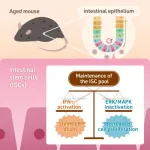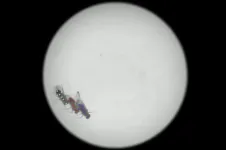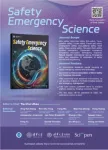(Press-News.org)
Collecting video data is the long-established way biologists collect data to measure the behaviour of animals and humans. Videos might be taken of human subjects sitting in front of a camera while eating in a group in the University of Konstanz, or researchers using cameras to measure how often house sparrow parents visit their nests on Lundy Island, UK. All these video datasets have one thing in common: after collecting them, researchers need to painstakingly watch each video, manually mark down who, where and when each behaviour of interest happens—a process known as “annotation”. This becomes a major bottleneck when analyzing data, as manually annotating these videos often takes a long time and can also be susceptible to human biases.
With the recent explosion of AI and computer vision, tools like ChatGPT can read an image and understand what is happening. You can enter a description of a video and AI models can generate a photo-realistic sample of it. In the minds of many biologists, surely these powerful models can help them save time on laborious video annotation, right? Unfortunately, this might not be the case yet. The problem is that every experimental set-up is different, every researcher wants to extract different things, and the best computer vision solution for each video type often changes depending on the circumstances. This makes it hard for biologists to figure out what AI model is best to use, even though computer scientists have developed many solutions over the years.
A diverse team of researchers from the Cluster of Excellence Collective Behaviour and the Max Planck Institute of Animal Behavior, led by PhD student Alex Chan Hoi Hang, hopes to solve this problem. Published in the journal Methods in Ecology and Evolution, the team introduced YOLO-Behaviour, a robust, flexible framework for behavioural annotation from videos. As opposed to the common definition of “You only live once”, YOLO stands for “You only look once”, a family of computer vision models that identifies objects from images by scanning through the image once. The team demonstrated the flexibility of the framework by presenting case studies that range from controlled lab environments to data collected in the wild. The framework can automatically identify house sparrows visiting nest boxes on Lundy Island, UK, Siberian Jays eating on a feeding stick in the Swedish Laplands, humans eating in a lab in Konstanz, pigeons courting and feeding in Konstanz, and zebras and giraffes running and browsing in a national park in Kenya.
SAMPLE VIDEO
“The beauty of the approach is how easy the tool is to use, yet so effective across so many study systems” says Alex Chan, PhD student at the University of Konstanz.
Lowering the barrier for automated analysis
YOLO-Behaviour is shown to work across a diverse range of study systems and case studies, and importantly very easy to train and implement, without the requirement of specialized coding expertise. To ensure that the method is widely usable, the authors also provided detailed documentation and instructions, as well as a video tutorial.“ Every behavioural ecologist that had to manually code videos has dreamt of having a tool that automates everything,” adds Chan. “I hope this tool can be a step towards that dream, to help researchers in animal behaviour save some laborious coding time,” said Fumihiro Kano, senior author of the paper.
This method has already contributed to automatically analyzing videos from each study system. In the Lundy house sparrow system, the method has been applied to extract parental visit rates for up to 2000 previously unanalyzed videos, more than doubling the amount of data available to gain insight into the causes and consequences of parental care behaviour. For the Siberian jay system, the method can be applied to process years of feeding videos, to study cooperative behaviour and how animals might have evolved to live in social groups. The method is also not limited to applications in behavioral ecology, with potential applications across diverse fields like psychology, animal welfare or livestock management. The hope is that this tool can be readily applied to different systems around the world, increasing the speed at which data can be collected and analyzed, to allow researchers to understand and measure animal behaviour.
Key facts:
Under embargo until 13 February 2025, 05:01 London time (GMT)
Publication: Alex Hoi Hang Chan, Prasetia Putra, Harald Schupp, Johanna Köchling, Jana Straßheim, Britta Renner, Julia Schroeder, William D. Pearse, Shinichi Nakagawa, Terry Burke, Michael Griesser, Andrea Meltzer, Saverio Lubrano, Fumihiro Kano. Methods in Ecology and Evolution, 2025. 10.1111/2041-210X.14502
Link: https://besjournals.onlinelibrary.wiley.com/doi/abs/10.1111/2041-210X.14502
The research team consists of multiple teams in the cluster of excellence collective behaviour. Authors Prasetia Putra, Harald Schupp, Johanna Köchling, Jana Straßheim and Britta Renner is part of a project related to collective appetite in the Cluster of Excellence Collective Behaviour.
Authors Michael Griesser, Andrea Meltzer and Saverio Lubrano are part of a team working on cooperative and group living behaviour of Siberian Jays, as part of the Cluster of Excellence Collective Behaviour and Max Planck Institute of Animal Behavior
Authors Julia Schroeder, William D. Pearse, Shinichi Nakagawa, Terry Burke are part of a team working on the Lundy House sparrow system, based in Imperial College London, UK.
END
KEY TAKEAWAYS
Brigham researchers analyzed data from 857 patients across 36 fMRI brain imaging studies and mapped a common brain circuit for creativity.
They derived the circuit in healthy individuals and then predicted which locations of brain injury and neurodegenerative disease might alter creativity.
The study found that changes in creativity in people with brain injury or neurodegenerative disease may depend on the location of injury in reference to the creativity circuit.
A new study led by ...
About The Study: From 2013-2014 to August 2021-August 2023, there were small increases in the percentage of children and adolescents with obesity, as well as in adults with severe obesity (but not obesity). There were no other significant changes in obesity-related measures, including waist circumference. This period included the COVID-19 pandemic; a study using electronic health records found a small increase in mean weight among adults during the pandemic.
Corresponding Author: To contact the corresponding author, Samuel D. Emmerich, DVM, email semmerich@cdc.gov.
To access ...
About The Study: The findings of this study provide evidence that fertility rates in states with abortion bans were higher than would have been expected in the absence of these policies, with the largest estimated differences among subpopulations experiencing the greatest structural disadvantages and in states with among the worst maternal and child health and well-being outcomes.
Corresponding Author: To contact the corresponding author, Suzanne O. Bell, PhD, email suzannebell@jhu.edu.
To ...
About The Study: U.S. states that adopted abortion bans had higher than expected infant mortality after the bans took effect. The estimated relative increases in infant mortality were larger for deaths with congenital causes and among groups that had higher than average infant mortality rates at baseline, including Black infants and those in southern states.
Corresponding Author: To contact the corresponding author, Alison Gemmill, PhD, email agemmill@jhu.edu.
To access the embargoed study: Visit our For The Media website at this link https://media.jamanetwork.com/
(doi:10.1001/jama.2024.28517)
Editor’s ...
A recent study led by Associate Professor Takuya Yamamoto and Researcher May Nakajima-Koyama has revealed that maintaining a delicate balance between interferon-gamma (IFN-γ) and extracellular signal-regulated kinase (ERK)/mitogen-activated protein kinase (MAPK) signaling is essential for preserving the intestinal stem cell population during aging. By comparing young and aged mouse intestinal tissues, the researchers uncovered critical insights into the interplay between these signaling pathways in supporting stem cell maintenance over time.
The intestinal epithelium exhibits the highest cell ...
For fruit flies, finding the right mate is all about the right song. Now, research shows that male flies don’t just try to impress their valentine by serenading her with song—they also go to great lengths to drown out the competition. By jamming their rivals’ love songs with high-frequency wing flicks, male fruit flies boost the chances that they’ll win the female over.
The new study, published in Cell, explains how the fruit fly brain coordinates courtship and aggressive competition—a framework which could ultimately help scientists understand how humans flexibly ...
With the promotion of the "the Belt and Road" initiative, the economy and society of BRI countries have developed rapidly, but they are also facing severe challenges of rising carbon emissions. Many countries rely on fossil fuels, and the process of energy transition is slow. Coupled with insufficient financial and technological support, especially low-income countries that have limited access to global climate funds, they face greater difficulties in the low-carbon transformation process.
To identify the carbon emission drivers at different development stages of BRI countries ...
Geoglossomycetes is a class within the phylum Ascomycota that accommodates a single order and a single family, comprising nine genera. Geoglossomycetes is traditionally referred to as “earth tongues”. The class is characterized by tongue-shaped to clavate, stipitate, black ascomata covered with or without black setae, a swollen ascigerous portion, a cylindric stipe, filiform, septate paraphyses, cylindrical-clavate, 4–8-spored asci, and filiform or falciform, multi-septate, dark brown to hyaline ascospores.
In collaboration with ...
This study is led by Dr. Zhu L. Yang (Key Laboratory of Phytochemistry and Natural Medicines, Kunming Institute of Botany, Chinese Academy of Sciences). Specimens were collected by Song-Yan Zhou and Fei-Fei Liu; microscopic and phylogenetic analyses of Thaxterogaster species were conducted by Zi-Rui Wang at Kunming Institute of Botany, Chinese Academy of Sciences.
The team used 514 (236 newly generated + 278 downloaded) sequences from 243 collections representing 112 species building a five-locus phylogenetic tree which includes most currently known lineages and newly described ...
In a significant endeavour to fortify international collaboration and drive innovation within the safety and emergency domain, Safety Emergency Science, a pioneering international academic journal, has been officially launched on the SciOpen platform. Jointly established by the China Association of Work Safety and Tsinghua University, this journal ushers in a new era in the global pursuit of excellence in safety and emergency research.
The journal made its debut at the 2nd Safety Technology Innovation Conference of the China Association of Work Safety, ...





